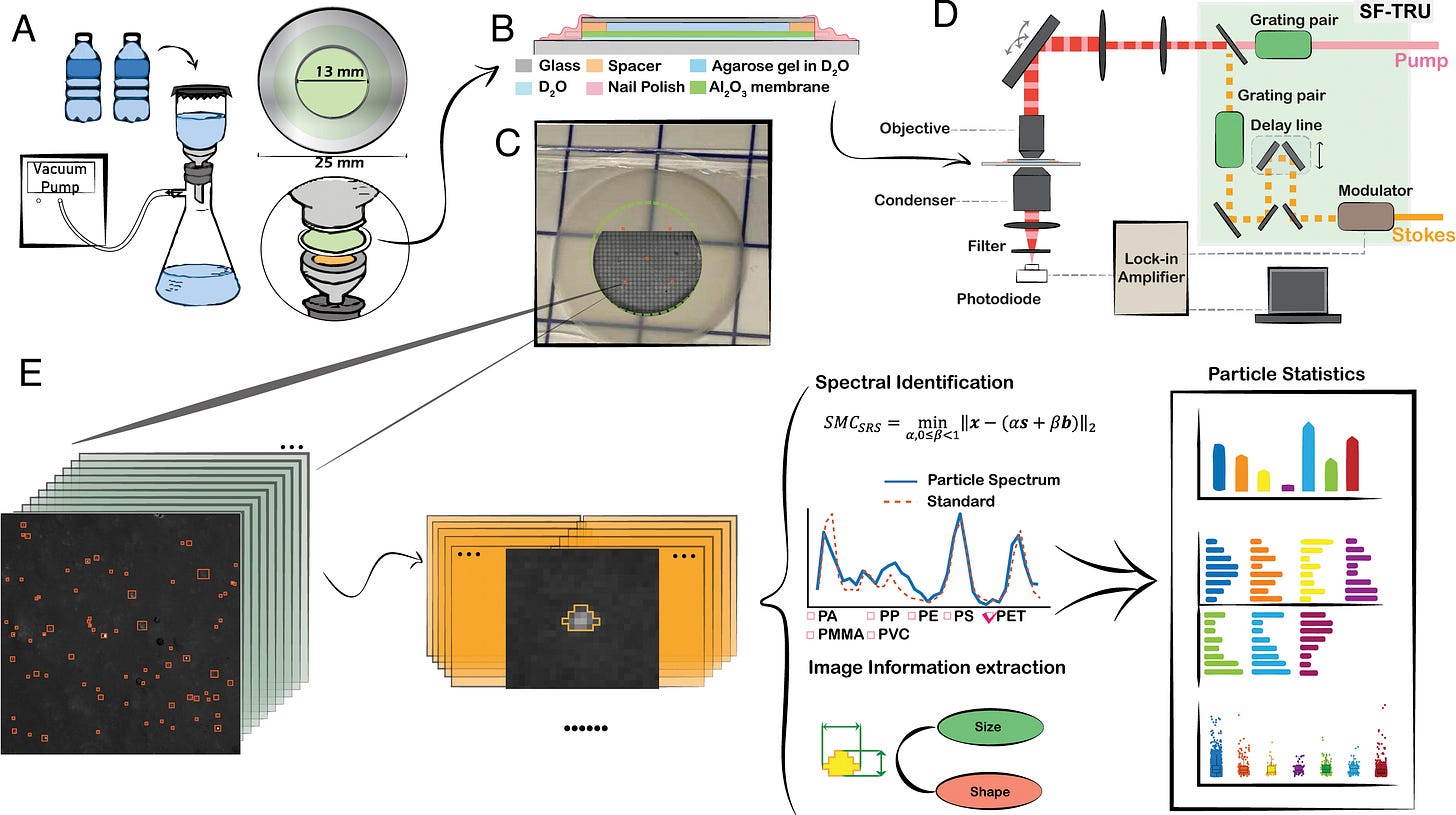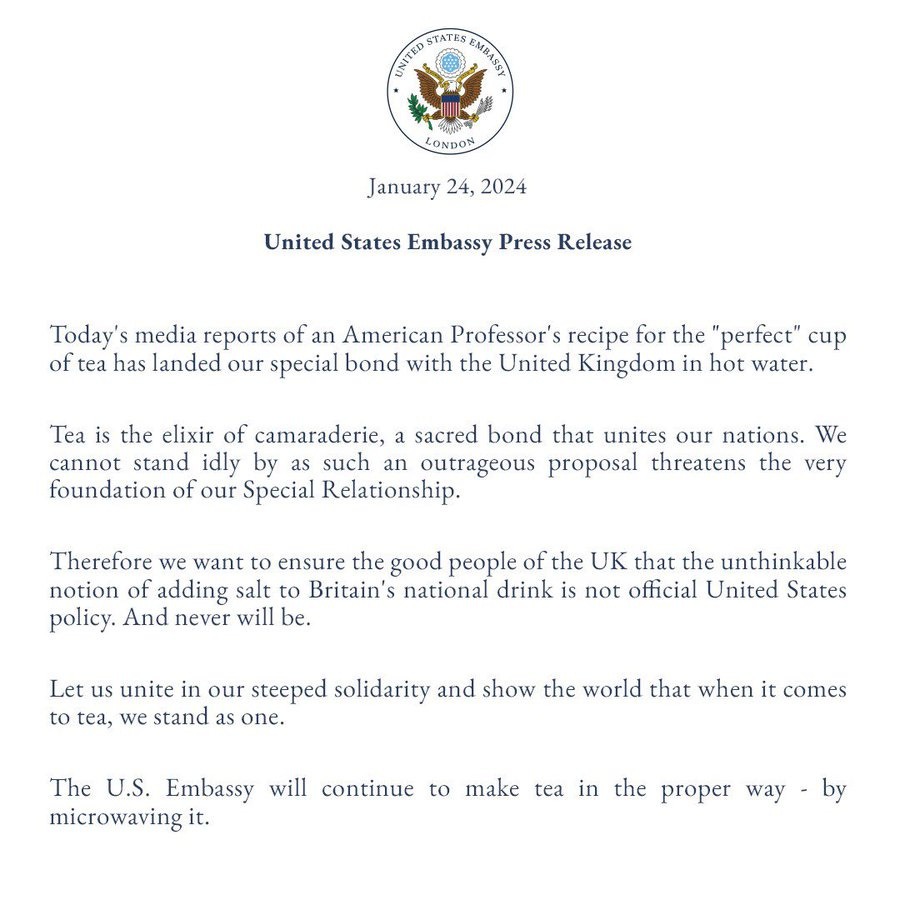123 | Case Study: Tiramisu Allergen Death | Food Contact Packaging |
Plus, an important letter from the US Embassy about tea
This is The Rotten Apple, an inside view of food integrity for professionals, policy-makers and purveyors. Subscribe for weekly insights, latest news and emerging trends in food safety, food authenticity and sustainable supply chains.
Erratum(s);
Save the date: Meet-up on Thursday 8th Feb (Friday for AU, NZ);
What’s Coming for The Rotten Apple for 2024 - a podcast, more meetups and…;
Packaging Corner;
Case study: Tiramisu Allergen Death - What Went Wrong?
Food Safety News and Resources;
An important letter from the US embassy;
Food fraud news, emerging issues and recent incidents
🎧 (New) Listen (now for everyone!) 🎧
Oh my gosh I am so thrilled to be here with you as we launch some exciting new features for this publication. This year we will be introducing monthly meet-ups - the first one is next week; a new packaging feature; and (drumroll please), a podcast.
If you’re not a podcast person, don’t worry, each episode is just me reading out the week’s email, so you won’t miss anything by not listening… except the chance to catch up while on the go.
Welcome to Issue 123 where I begin with clarifications and corrections from last week. GMO lettuces are in fact a thing, and GCMS testing for microplastics sounds kind of wrong, but maybe sort of isn’t. Details below.
This week’s big story is a deep dive into what went wrong to cause the death of an allergic food consumer in Italy last year. Investigators have recommended manslaughter charges are laid, so it’s all quite bad (and sad).
On a brighter note, our brand-new packaging feature debuts this week, with a short collection of food packaging related news items and guidance. Plus a letter to get tea-drinkers hot under the collar.
Enjoy,
Karen
P.S. If you love this newsletter, please tell your friends and colleagues about it and help grow our community of global food safety champions.
Save the date: Meetup 8th Feb, 2024
In 2024 we’re having monthly meetups. The first one is next Thursday 8th Feb (Friday 9th for Australia and New Zealand).
Erratum(s)
GMO Lettuce
I love it when readers write in to tell me I’ve got the wrong end of the (food science) stick. Last week, Theo W. Prins from Wageningen University, who works on the detection of GMOs in food and feed, wrote to tell me that my flippant comments about non-GMO-certified lettuce were not correct. Thank you, Theo!
Theo writes: “There is indeed a GMO (gene-edited) lettuce with increased vitamin C from China and a non-browning lettuce from Intrexon. You can find these in our GMO database EUginius.
“It is still highly questionable whether you can already buy these Gene-Edited lettuces, but it is theoretically possible. I cannot imagine that they did a DNA-test on the lettuce since there is no detection method available for these GE-lettuce events (as far as I know). So perhaps they deduced it from paper-trail evidence.”
GCMS detection of microplastics
Expert molecule detector, Adomas Malaiska, took issue with the microplastics story in last week’s issue, specifically my claim that GCMS-based methods (gas chromatography - mass spectrometry) are used for monitoring microplastics in terrestrial samples.
Adomas says: “GCMS is typically used for organic compounds in the volatile to the semi-volatile range. Microplastics are typically particles which are fairly stable, do not naturally evaporate into the air, making it hard to detect them using gas analysis. Therefore usually other methods are used.
“To identify non-volatiles based on chemical properties, usually liquid chromatography (LC or HPLC or LCMS) is used. For analysis focusing specifically on particle size and shape there are other techniques, one which comes to mind being Scanning Electron Microscope (SEM) which screens structures down to nano range.”
My information about the use of TED-GCMS for microplastics detection came from a peer-reviewed paper by Brunning et al (2021), which referenced previous papers, so it seems like at least some researchers have used it at some point. I await further enlightenment.
By the way, Adomas writes a newsletter called Molecular Spectacular, you can check it out here.
What’s Coming in 2024 for this Publication?
I’ve got an exciting year ahead for you, dear readers! In 2024 we are launching monthly meet-ups, Packaging Corner and a (drumroll please) a podcast.
Meet-ups are informal get-togethers for readers of this newsletter, hosted on Zoom - think of them as a virtual water-cooler chat. Last year they were infrequent. This year they will be every month. July’s meet-up will be held in person in Long Beach California during the IAFP Conference.
Introducing: Packaging Corner! Food contact packaging is the neglected cousin of the food safety world, but together we can change that. Packaging Corner will feature food-safety-related news for packaging materials for both free and paying subscribers. I’ll continue to share news of fraud in packaging for paying subscribers.
Launching today: The Rotten Apple Podcast. Each episode is a 15 minute, low-fuss rendition of this email, read aloud by me.
Podcast setup: Episodes can be listened to using a podcast app. Click this link on your phone to get connected. Or listen directly in your browser by simply clicking the 🎧 link near the top of each email. The podcast will be ‘findable’ and ‘followable’ on all major podcast apps in the coming weeks.
Case Study: What Went Wrong, the Tiramisu Death
“There is always a danger that compassion fatigue could set in with allergen deaths like this. We could just look at it as a technical exercise in root cause analysis and management controls . Anna Bellisario was a person. Whose tragic early death will impact family and friends. So many of these cases take the lives of the young. I try to remember that people will be grieving a very personal loss.” Sterling Crew, President of the Institute of Food Science and Technology (via LinkedIn)
When Anna Bellisario died last year, she was 20 years old. She had just eaten a spoonful of ‘vegan’ tiramisu, a creamy Italian dessert usually made with mascarpone cheese at a vegan burger chain in Milan, Italy. She was allergic to milk protein and egg.
Her boyfriend, who was with her in the restaurant when she went into anaphylactic shock, told reporters she was careful about her allergies, which were severe, eating out only rarely, and carefully questioning the restaurant staff before ordering that day.
Deaths like this, which are both accidental and preventable, happen far too frequently. Earlier this month, an English court heard how another young person, James Atkinson, aged 23, died after having an anaphylactic reaction to peanuts in pizza.
In 2022 I shared the story of Celia Marsh, who died from her milk allergy after eating a sandwich with supposedly dairy-free coconut-based yoghurt-style dressing that contained traces of milk protein. There are doubtless dozens more incidents like this which don’t end up in news reports, or law courts, every week.
No wonder my food safety colleagues are worried about ‘compassion fatigue’.
What went wrong
The court findings from Celia Marsh’s case found that a starch-based ingredient in the dairy-free coconut yoghurt used to make the dressing on the sandwich contained traces of milk protein due to cross-contamination during its manufacture. The yoghurt manufacturer had documents that “flagged this risk”, said the coroner, but the information was not passed on (source).
The investigation into James Atkinson’s death found he had not informed the restaurant of his peanut allergy before ordering the food, but had instead “researched likely ingredients in certain foods” before eating the pizza.
High levels of allergens
In the case of Anna Bellisario, Italian newspapers reported that prosecutors are expected to charge the makers of the tiramisu with ‘negligent cooperation in the murder’ (manslaughter) of the young woman.
One Italian news report claimed the vegan dessert had been made with mascarpone, while another report quoted the prosecutor as saying it “contained a high quantity of allergenic proteins from cow's milk, in particular caseins".
Other ‘vegan’ foods at the Milan restaurant, including mayonnaise and mustard, contained egg proteins.
Critical food safety failings
Investigators allege they found “multiple critical [food safety] issues” at the Milanese company which made the tiramisu and sold it to the restaurant where Anna dined. The investigating judge Fiammetta Modica described “a worrying picture of unscrupulousness.” Allegations of food safety problems include:
Vegan and non-vegan products made on the same table at the same time;
Mixing up of ingredients of animal and vegetable origin, such as confusing mascarpone with plant-based ingredients;
Inadequate training for workers.
Italian food safety authorities ordered the vegan tiramisu product recalled after the incident.
The owners of the company, which also supplied 63 other restaurants, have been banned from operating a business for one year in addition to facing manslaughter charges. They also face legal action by the restaurant for personal and reputational damages.
Compliance and confusion
Celia and Anna both died after eating ‘vegan’ foods that contained animal proteins. Such deaths are horrible and preventable, but - sadly - we can expect more of them because of the confusing regulatory situation.
Right now, most food regulatory systems do not demand or expect food manufacturers to ensure ‘vegan’ labelled food is completely free from traces of animal proteins. In the United Kingdom, Anaphylaxis UK was calling for a robust system to ensure the absence of allergenic animal proteins in foods marketed as vegan after the investigation into Celia’s death concluded in 2022.
Experts disagree about whether ‘vegan’ labelled foods should be allowed to contain traces of animal protein from unintentional sources. Some, say yes, as long as ‘May Contain’ statements are present and accurate, supported by regulatory and industry bodies that reiterate ‘vegan’ does not mean 'allergen free’. Others experts say ‘No’, arguing that consumers understand vegan to mean a food that is completely free from any trace of animal product.
Consumers are frustrated. They say it’s ridiculous for the label on a vegan food to say “may contain traces of milk, egg and fish”. I am inclined to agree.
I’m not alone. I’ve heard of one food company’s decision to remove vegan claims from a product when the specification sheet for an ingredient stated it was made on the same production line as milk-containing ingredients and it could not be guaranteed to contain no traces of milk.
Should consumers understand the difference between ‘vegan’ and ‘allergen-free’?
Consumers can be forgiven if they don’t understand the difference between ‘vegan’ and ‘allergen free’ because even some food businesses don’t understand. I’ve heard of a new food manufacturer that thought vegan was the same as vegetarian - a mistake which thankfully got caught before production started!
Even vegan restaurants can get it wrong. A consumer said she tasted milk in a ‘vegan’ smoothie at a vegan eatery, with the food preparer saying they thought goats’ milk was okay for vegans because “it’s not cows’ milk”. One wonders why there was even any type of animal milk in a vegan eatery.
Anna Bellisario knew the difference between vegan and allergen-free, but that didn’t save her. She did not assume that food at the vegan restaurant where she last dined would be completely free from milk or eggs, asking the restaurant for a list of allergens before she ordered (source). For her, the information was wrong, and she died. So sad.
Takeaways for food professionals
While it is not necessarily against the law to sell ‘vegan’ food that contains traces of allergens, the presence of animal proteins in foods where they are not expected poses serious risks to allergic consumers.
Food companies are expected to protect consumers from risk and act with ‘due diligence’. Companies that do not exercise due diligence can be prosecuted for negligence, as is expected for the manufacturer of the dessert that killed Anna Bellisario.
Company(s) in the supply chain of the sandwich that killed Celia Marsh were not diligent about communicating allergen risks to their customers. The manufacturer of the dessert that killed Anna Bellisario has been accused of being insufficiently diligent with their manufacturing processes. The owners of the company are expected to be charged with manslaughter and have been banned from operating a business as well as facing litigation.
When food businesses are not sufficiently diligent, consumers die. And that is not something any business or food professional wants.
In short: 🍏 Courts have heard that a purportedly ‘vegan’ dessert which caused the death of an allergic consumer contained high levels of milk proteins 🍏 The owners of the company that manufactured the dessert are expected to be charged with manslaughter 🍏 Prosecutors allege serious critical failings at the manufacturer’s premises including poor or non-existent separation of vegan and non-vegan products during manufacture, confusion from staff about which ingredients were of animal or vegetable origin, inadequate training for workers 🍏 Regulations do not define whether vegan-labelled foods must be allergen-free (many jurisdictions) 🍏 From a regulatory perspective, all food businesses, including restaurants and food manufacturers, must exercise sufficient care (“due diligence”) to protect consumers 🍏 When businesses fail to exercise due diligence, consumers die 🍏
Sources and further reading
All sources for this story are quoted using inline hyperlinks.
Read more: Is a new vegan definition needed to protect consumers? (foodmanufacture.co.uk)
Read more: Allergen-free and vegan claims guidance | The Food & Drink Federation (fdf.org.uk)
Packaging Corner
Nanoplastics in bottled water
Researchers found much greater quantities of nanoplastics than were previously thought to be present during testing of bottled water. The nanoplastics are thought to be derived from the packaging materials and from filters used during water purification.

Testing and analysis strategies for food packaging
An article about the importance of testing in food packaging came across my desk last week. It covers chemical testing including migration tests, physical testing, for mechanical properties, and testing of the packaging within the food product shelf life context, including biodegradability.
After-life testing was a new concept for me. This is testing for recyclability, biodegradability and microplastic shedding characteristics.
Read the article here (open access) - Food Science and Technology - Wiley Online Library
Food safety alerts for packaging
Lead and phthalates were found when pizza box(es) from Turkiye were subjected to migration testing - France, 19th Jan 2024. RASFF Notification
Fraud in polymer supply chains
A premium brand of fluoropolymer used in the manufacture of packaging was being counterfeited by an operation making and selling tons of fluoropolymer and labelling it as Viton FreeFlow without the authorisation of the brand owner. More details and sources can be found in Issue 121’s food fraud news (for paying subscribers).
Food Safety News and Resources
Our news and resources section has not-boring food safety news plus links to free webinars and guidance documents: no ads, no sponsored content, only resources that I believe will be genuinely helpful for you.
This week’s highlight: a food safety recall because of moth larvae in crackers
Click the preview below to access it.
Food Safety News and Resources | January
29 January | Food Safety News and Free Resources | Recall: Listeria in leafy greens (USA) | Unusual Recall: Moth Larvae in crispbreads and biscuits (crackers) | Resources: Reviews of current evidence for the impacts of certain food contaminants on the human gut microbiome (FAO) |
An Important Letter from the U.S. Embassy (Just for Fun)
And now, an important letter from the United States Embassy to the citizens of the United Kingdom. About tea.

What you missed in last week’s email
Introduction to hygienic design principles (plus downloadable sanitary design checklist) - supplement for paying subscribers;
Microplastics: do we really eat a credit card’s worth of plastic each week?
Reader survey results (with colourful pie charts!);
Silly food claims;
Food fraud news, emerging issues and recent incidents.
Below for paying subscribers: Food fraud news, horizon scanning and incident reports
📌 Food Fraud News 📌
In this week’s food fraud news:
📌 A wine trader shares his experience with wine fraud;
📌 More insights into the olive oil crisis;
📌 Eggs (England and Scotland);
📌 Illegally transhipped seafood + more.






